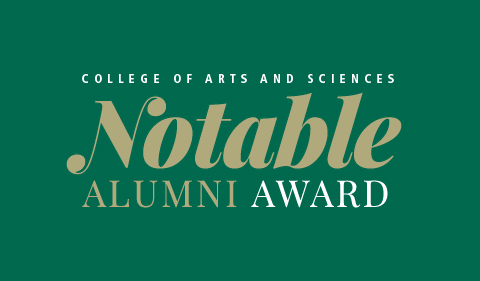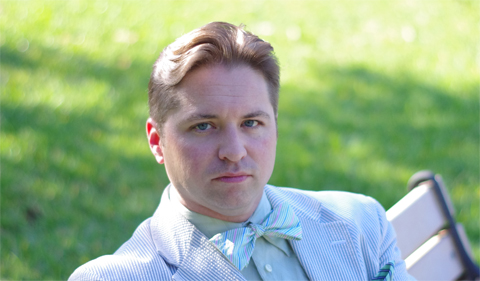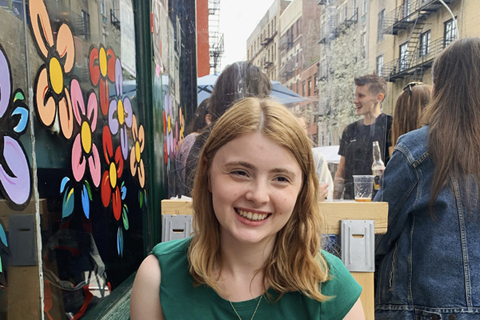
Editor’s Note: The College of Arts & Sciences launches the Notable Alumni Awards, honoring 37 Notable Alumni in 2017 for broad accomplishments in their careers, a commitment to community service, and valuable contributions to Ohio University, the College of Arts & Sciences, and its students.
Dr. Taylor Hagood, ’96, ’98, ’00M.A. English
A native of Mississippi, Taylor Hagood moved with his family to Steubenville, Ohio, in 1989, graduating from Indian Creek High School in 1994. He began his college career at Ohio University’s Eastern campus, where he came under the influence of Thomas Flynn and David Noble, the latter being a role model for him as the example par excellence of an English professor.
With the idea of pursuing an academic career in English, Hagood transferred to Athens where he received his B.A. and then his M.A., writing a thesis on William Faulkner under the direction of Marsha Dutton. Entitled “‘Fabulous Immeasurable Camelots’: Faulkner’s Absalom, Absalom! and Malory’s Le Morte Darthur,” the thesis explored the ways Faulkner uses the Arthurian legend, especially as exemplified in Sir Thomas Malory’s book, to articulate a legend of family decay in the United States South. The thesis won the 2000 Masters Thesis of the Year Prize, and Hagood developed it into his first critical article, published in The Southern Literary Journal in 2002.

Dr. Taylor Hagood
Currently, Hagood holds the position of Professor and Director of the developing Center for the Study of the Americas at Florida Atlantic. He lectures regularly for the Osher Lifelong Learning Institute in Boca Raton and Jupiter and held the 2013-2014 Lifelong Learning Society Distinguished Professor of Arts and Letters position. He is a Research Ambassador for the Deutsche Akademischer Austauschdienst/German Academic Exchange Service, based in Manhattan.
Hagood earned his A.A., B.A., and M.A. from the College of Arts & Sciences at OHIO, all in English (’96, ’98, ’00).
Upon graduation, Hagood returned to his native state to study at the epicenter of Faulkner studies, the University of Mississippi. There he held the Frances Bell McCool Dissertation Fellowship in Faulkner Studies, writing his dissertation under the direction of Donald M. Kartiganer and Joseph R. Urgo.
He earned a Ph.D. in May 2005 and began a tenure-track Assistant Professor of American literature position at Florida Atlantic University. He immediately revised his dissertation into a book manuscript, which was published in 2008 by Louisiana State University Press and titled Faulkner’s Imperialism: Space, Place, and the Materiality of Myth. The book has been described as one of the “great achievements of [the era since the early 1990s in its . . .] New Historical relocation of Faulkner’s writing practices in relation to state discourses, legal statuses, philosophical jargons, and imperialism.”
Hagood followed this publication with a second book, published in 2010 by Ohio State University Press titled Secrecy, Magic, and the One-Act Plays of Harlem Renaissance Women Writers. This book marked the first book-length study of largely unknown one-act works by Zora Neale Hurston, May Miller, Marita Bonner, and other writers.
When that book was published, the contributor copies went to Hagood’s new address in Munich, Germany, where he was serving as a Fulbright Professor at the University of Munich. While teaching there throughout the 2009-10 academic year, he worked on his next book, which was published in 2014.
This book, titled Faulkner, Writer of Disability, received high acclaim, winning the C. Hugh Holman Award for Best Book in Southern Studies, the most prestigious award given by the Society for the Study of Southern Literature. As one reviewer wrote, “In less than 200 pages, Hagood builds the scaffolding for future scholars to probe a Faulknerian world in which disability is not a symbolic gesture or stylistic technique but a universal condition that provides endless opportunities for interrogation.”
Not only does the book break ground in its content, its style disrupts conventions of academic writing, playing within such genres as screenwriting, biography, and even email in order to challenge conventions of normality and thus embody the very principles of disability studies.
Hard on the heels of this book came another, this one a coedited collection of essays titled Undead Souths: The Gothic and Beyond in Southern Literature and Culture (2015). Hagood, his coeditors, and the many contributors all examine “undeadness” in the South, not just in the form of vampires and zombies (of which there are plenty), but also undeadness as a trope for the Confederacy, for the condition of African Americans during Jim Crow, and for a contemporary post-southern landscape in which the idea of a “natural” South has been replaced by images and items of southernness created and dispersed through mechanical reproduction.
Hagood’s essay in the book examines the HBO series True Blood and the novels of Charlaine Harris and the corresponding AMC The Walking Dead along with the Dark Horse comic The Goon. The book garnered something rare for academic writing—a Publishers Weekly review—and it has been reviewed well and often: as one writer put it, “Being self-aware and meta without being campy or politically irrelevant is very hard to pull off, but the editors of this volume do it—and even make it look easy.”
Connections to Ohio University
“I had no prior connection to OHIO before I enrolled as a student there, but since then my connections have been strong. I have maintained relationships with faculty and students both. Among the faculty, I have remained in degree of contact with Marsha Dutton, Thomas Flynn, Robert DeMott, and Samuel Crowl; among students, David Ramm and Nicole Zehr remain some of my best friends, and I stay in contact with Scott Henkel and Kelly Kinney, who are now professors in Wyoming,” Hagood says.
“Aside from these things, my younger sister went to OHIO, receiving a B.A. in Communication and an MBA. She worked for a number of banks before getting married and having two children.”
Favorite Bobcat Memory
“It’s too difficult to talk of a single memory—the more I think about it, the more memories come to mind. My favorite times were small things such as walking with friends across the green amid falling leaves or in snow or new grass on the way to get pizza at Goodfella’s. I also loved the plays, including a great production of Tartuffe. It goes without saying that Athens is a great Halloween place: just thinking of the Ridges exists evokes the holiday for me,” Hagood says.
“One memory that comes to mind though is playing the baby grand piano in the Baker Center. I was never quite sure if I was actually allowed to play it, but I did anyway.
“I guess my favorite memory was going fishing on the Hocking River with my friend, Mike Danko. We set out early on a sparkling morning, walking in the dew to the river bank and fishing for hours. We didn’t catch anything, but we had a good time. And he wrote an essay about it in his creative dissertation.”
Highlights from an OHIO Mentor
“I would highlight two major mentors: Marsha Dutton and David Noble. Professor Dutton came to OU in 1999 and taught a graduate course on the Arthurian Legend. She was a demanding professor—she had put together her own writing guide which students were required to buy and which had a number system for all the writing infractions. She had grown so tired of marking split infinitives so often she just circled it and wrote a number in the margin for the students to look up,” Hagood says.
“I learned more about the nuts and bolts of working with prose from her than from anyone else. She went through draft after draft of my thesis, always filling it with revision suggestions, asking questions, pushing. It is hard to imagine a more dedicated editor (and in fact she has done extensive editing).
“From her I gained the confidence to know what it takes to forge strong prose. She also helped orient me in the field, encouraging me to go to conferences. She is a wonderful person and a wonderful mentor,” he says.
“I must also mention David Noble, who taught in St. Clairsville. He was one-of-a-kind, rolling up to campus in his black BMW coming into the hinterland from his home in Pittsburgh. He always wore fly-fishing vests over button-downs and he spoke with a distinct West Virginia accent. He showed me how to be a southerner in the North, how to own that identity with confidence and the right amount of self-awareness and irony,” says Hagood.
“Being in his class was like nothing else—you never knew what would happen next. I’ll mention just one example: I took one class with him on what he called “Literature of the Dark Ages” during the spring quarter. It was a four-hour long marathon course that took place once a week in the evening. Often, Dr. Noble would speak of the ‘blue gloaming,’ and as the spring accomplished, he one evening went out before class and cut a number of apple blossoms off the trees on the grounds and brought them into the classroom for us to delve our noses into.”



















Comments